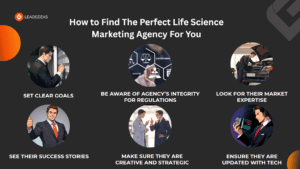In the fast-paced world of life sciences, getting your innovations noticed by the right people can be a daunting task. That’s where a life science marketing agency steps in, your partner in translating complex products into compelling stories. Before diving into such a crucial partnership, here’s a straightforward guide on what to consider for a fruitful collaboration.
Set Clear Goals
First up, you’ve got to know what you want. Are you trying to get the word out on a new product, find more customers, or lead the market? Pinning down your aims helps point you to an agency that lines up with what you’re after.
Example of Objectives
-
Product Launches: Are you introducing a novel therapeutic device or a SaaS platform for clinical trials? Define whether your goal is awareness, adoption, or market penetration.
-
Regulatory Milestones: If seeking approval (e.g., FDA, EMA), align with an agency experienced in campaigns that balance promotion with compliance.
-
Market Leadership: Aiming to position as a thought leader? Prioritize agencies skilled in content marketing and KOL (Key Opinion Leader) engagement.
Actionable Steps
-
Draft a SMART Goal Framework (Specific, Measurable, Achievable, Relevant, Time-bound).
-
Example: “Increase HCP (Healthcare Provider) awareness of our gene therapy by 40% in the EU within 12 months.”
-
-
Ask Agencies: “How have you tailored strategies for goals similar to ours?”
The Importance of Regulatory Know-How
The life science field is full of rules and regulations. Your chosen marketing agency should be a pro at navigating these, ensuring that your marketing efforts are both effective and compliant. This knowledge is crucial for communicating complicated scientific information within the lines drawn by regulations.
Key Regulations
-
FDA Guidelines: For U.S. promotions, adherence to Fair Balance requirements (risks/benefits).
-
GDPR/CCPA: Data privacy laws impacting digital campaigns and patient interactions.
-
EMA Transparency Standards: For EU-centric materials.
Agency Capabilities
-
In-House Legal Teams: Ensure real-time compliance checks on claims and disclaimers.
-
Experience with Submissions: Familiarity with regulatory submissions for promotional materials.
Questions to Ask on Compliance
-
“Can you share examples of campaigns that required rigorous regulatory oversight?”
-
“How do you handle updates to compliance standards mid-campaign?”
Look for Market Expertise
The world of life sciences is vast. Pick an agency that knows your market well. Their knowledge means they’ll get who you’re trying to reach and the best ways to speak to them.
Example of Market Expertise
-
Pharma: Requires strategies targeting prescribers, payers, and patients.
-
MedTech: Often involves educating both clinicians and procurement teams.
-
Biotech Startups: Needs investor-focused messaging alongside scientific outreach.
Look into Their Success Stories
Take a look at what the agency has pulled off before. Success stories that match up with what you’re aiming for are a good sign they can help you reach your goals too.
What to Watch out For in Success Stories
-
Quantifiable Outcomes: Look for metrics like:
-
50% increase in HCP engagement via webinar campaigns.
-
30% faster market entry post-regulatory approval.
-
-
Relevance: Ensure case studies align with your challenges (e.g., launching in regulated markets, overcoming adoption barriers).
- Red Flags: Vague claims like “increased visibility” without data.
What to Ask Agencies Relating to Success Stories
-
“How did your campaign for [Similar Client] directly influence their sales pipeline?”
-
“What role did you play in their regulatory approval process?”
Creative and Strategic Thinkers
A top-notch agency combines creativity with strategic thinking. They should be able to articulate your scientific innovations in ways that grab attention, using everything from social media to industry events.
Expertise Related to Creativity and Strategic Capabilities
Their Content Formats
- Interactive Tools: Patient outcome simulators or dosage calculators.
- Video Abstracts: Simplify clinical trial results for busy HCPs.
- Virtual Congress Booths: Engage global audiences post-pandemic.
Their Strategic Channels
- LinkedIn for KOL Outreach: Publish peer-reviewed study summaries.
- Podcasts: Position executives as thought leaders through interviews.
Up-to-Date with Tech
In our digital age, being tech-savvy is a must. Ensure your agency is up to speed on using the latest tools to boost your online presence and effectively target your messages.
Tools and Uses to Watch out For
AI & Predictive Analytics
- Identify HCPs with high intent using behavioral data.
- Personalize email campaigns while adhering to privacy laws.
- CRM systems used to track and measure lead generation performance
Questions to Ask
-
“How do you balance personalization with data privacy regulations?”
-
“What tools do you use to measure campaign ROI in regulated environments?”
Communication Is Key
Good communication is the backbone of a good partnership. Expect clarity around strategies, progress, and how your budget is being spent. Flexibility to adapt strategies based on results is also crucial.
Example of Structured Collaboration
-
Reporting Cadence: Weekly updates with metrics like engagement rates, lead quality, and compliance audits.
-
Adaptive Strategies: Regular strategy reviews to pivot based on data (e.g., shifting budget from underperforming channels).
-
Budget Transparency: Clear breakdowns of spend across creative, media, and compliance.
Cultural Fit
Lastly, the partnership needs to feel right. You’re looking for a team that feels like an extension of your own, where the working relationship is smooth, and you’re on the same page in terms of values and approach.
Some Alignment to See
-
Ethical Marketing: Ensure the agency prioritizes patient safety over aggressive promotion.
-
Team Integration: Do they collaborate seamlessly with your regulatory and R&D teams?
-
Innovation Mindset: Look for partners who challenge norms (e.g., leveraging VR for surgical device demos).
Picking the right life science marketing agency to assist your brand can hugely affect your growth trajectory and market impact. With a clear understanding of your goals, a keen eye for an agency’s regulatory expertise, specialized experience, success stories, creativity, technological savvy, communication style, and cultural fit, you’re well on your way to a partnership that not only meets but exceeds your expectations.
After all, the right life science marketing agency isn’t just another contractor; it’s a pivotal ally on your journey to success. If you are interested in knowing more about some of the marketing agencies who has expertise in life science, we listed our top 5 picks here!
Want to read more topics like this? Feel free to visit our blog! We go more into tips, strategies and approaches for B2B Lead Generation every single week!
Interested in learning more? Visit us now!















Leave a Reply